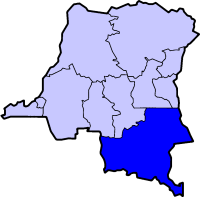
| Katanga Province du Katanga | |||
|---|---|---|---|
| — Province — | |||
| |||
| Coordinates: 11°08′28″S 27°06′17″E / 11.14111°S 27.10472°ECoordinates: 11°08′28″S 27°06′17″E / 11.14111°S 27.10472°E | |||
| Country | |||
| Capital | Lubumbashi | ||
| Largest city | Lubumbashi | ||
| Government | |||
| - Governor | Moïse Katumbi Chapwe | ||
| Area | |||
| - Total | 496,871 km2 (191,843 sq mi) | ||
| Population (1998 est.) | |||
| - Total | 4,125,000 | ||
| - Density | 8.3/km2 (21.5/sq mi) | ||
| Demonym | Katangan | ||
| National language | KiSwahili, Tshiluba | ||
| Districts | 5 | ||
| Cities | 3 | ||
| Website | katanga.cd | ||

Katanga is one of the provinces of the Democratic Republic of the Congo. Between 1971 and 1997, its official name was Shaba Province. Under the new constitution, the province was to be replaced by four smaller provinces by February 2009; this did not actually take place. Its regional capital was Lubumbashi (formerly Elisabethville in French, Elisabethstad in Dutch). Its area was 518,000 km² (larger than California and 16 times larger than Belgium, its former colonial ruler). Katanga had a population estimated in 1998 at about 4,125,000. Farming and ranching are carried out on the Katanga Plateau. The eastern part of the province is a rich mining region, which supplies cobalt, copper, tin, radium, uranium, and diamonds. The capital city, Lubumbashi, is the second largest city in the Congo.
Contents[hide] |
[edit] New provinces
The new Congolese constitution proposes to split Katanga into four new provinces:
[edit] History
In the past, Katanga has struggled significantly for independence from the rest of the country.
[edit] Government
Moïse Katumbi Chapwe, a businessman, is the governor of Katanga province. He took office on 24 February 2007.[1]
[edit] Economy
Copper mining is an important part of the economy of Katanga province.[2] Cobalt mining by individual contractors is also prevalent. There are a number of reasons cited for the discrepancy between the vast mineral wealth of the province and the failure of the wealth to increase the overall standard of living.[3] Gecamines is the state owned mining company which has monopoly concessions in the province.
[edit] Medical care
The Jason Sendwe Hospital is the largest hospital in the province. It is located in Lubumbashi.
[edit] Climate
Katanga has a wet and dry season. Rainfall is about 49 inches per year (120 cm).[4]
[edit] Geography
The province forms the Congolese border with Angola and Zambia. The province also borders Tanzania, although Katanga province and Tanzania do not share a land border but the border is within Lake Tanganyika.
[edit] Education
The University of Lubumbashi is the largest university in the province and one of the largest in the country. The university is located in the northern part of Lubumbashi city. The Faculté Méthodiste de Théologie (FMT) is a Methodist seminary which is accredited within the university system.
TESOL, the English Language School of Lubumbashi, is a secondary school that serves the expatriate community. It was founded in 1987 on the grounds of the now defunct French School.[5]
[edit] Transportation
Katanga Province has limited railway service centered around Lubumbashi. Reliability is limited. The area also has an airport called Luano Airport which is located northeast of Lubumbashi.
[edit] Media
Katanga province is served by television broadcasts. Radio-Télévision Nationale Congolaise (RTNC) has a transmitter in Lubumbashi that re-transmits the signal from Kinshasha. In 2005, new television broadcasts by Radio Mwangaza began in Lubumbashi.
[edit] Notable Katangans
- Laurent Desire Kabila former President of the Democratic Republic of the Congo
- Moise Tshombe former President of the breakaway State of Katanga
- Barbara Kanam popular African music singer



No comments:
Post a Comment